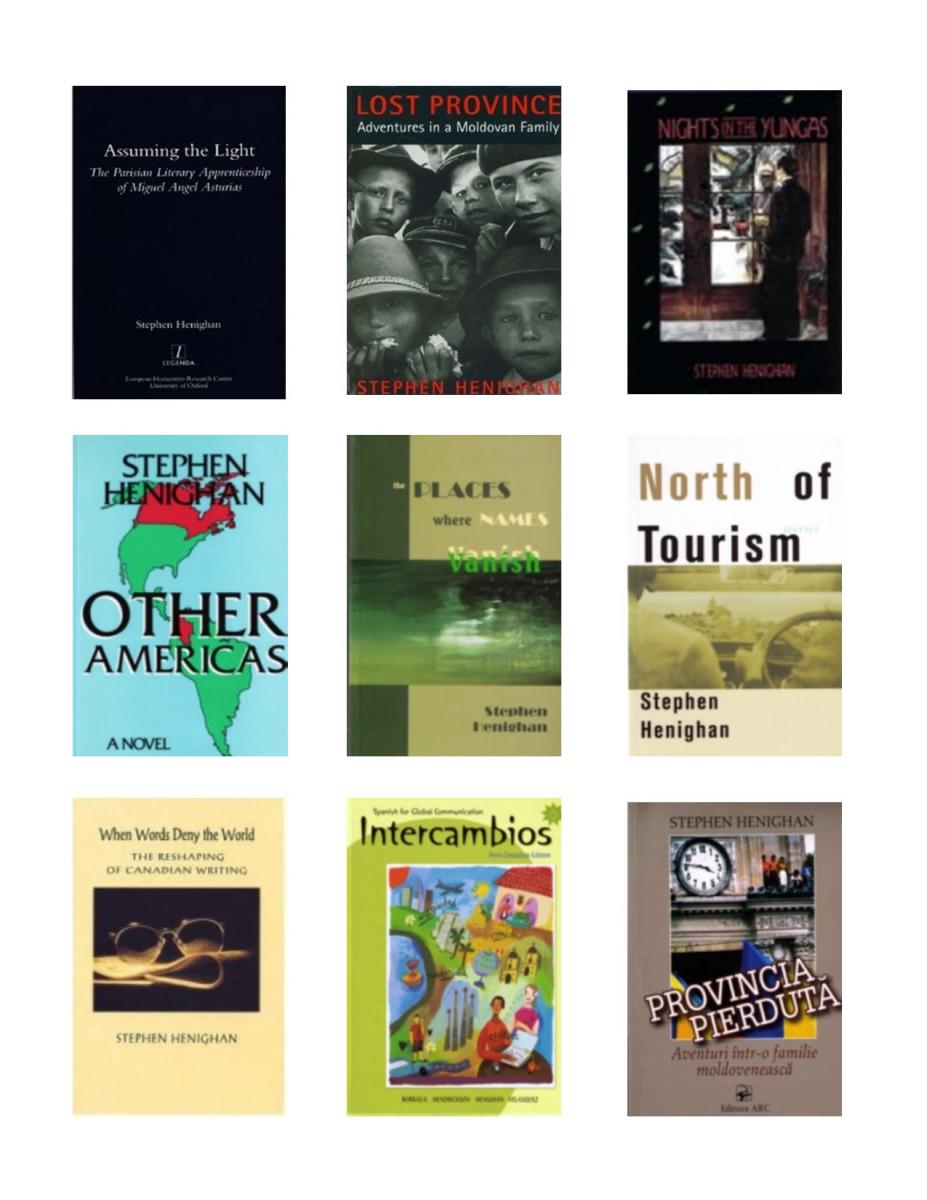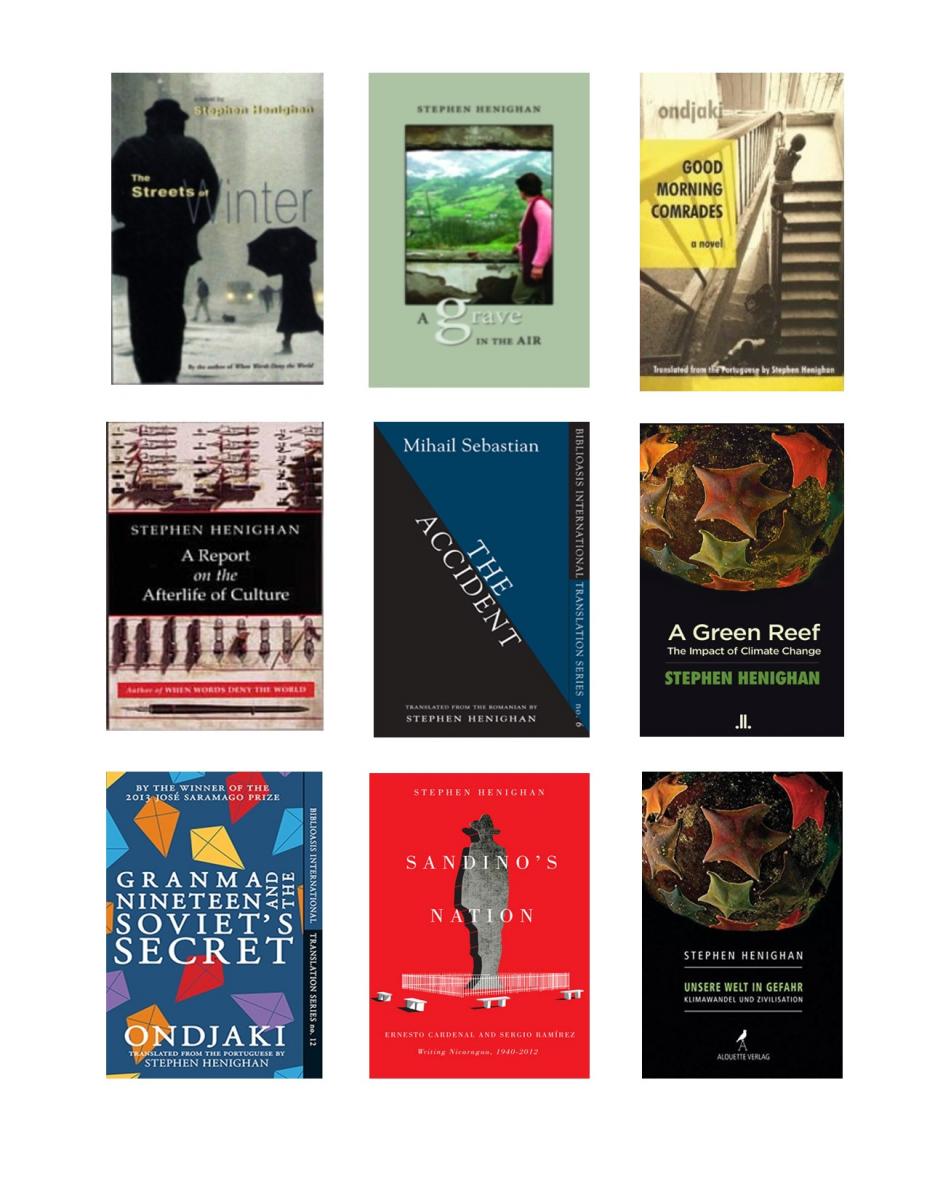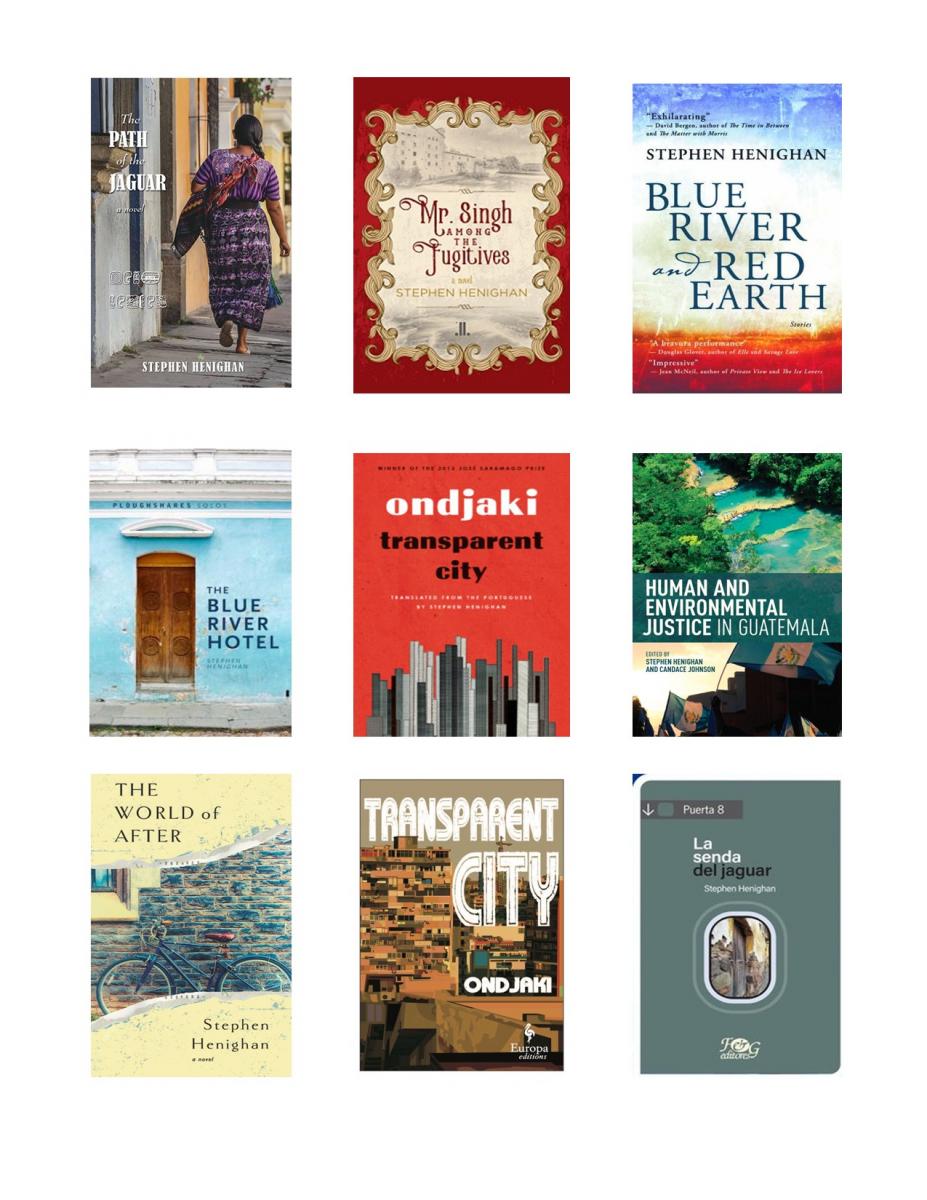1. Critical
- "La retórica revolucionaria del padre: una lectura de 'Catalina y Catalina'," Las vidas y la obra de Sergio Ramírez (Madrid: Instituto Cervantes, 2024), ed. Francisco Javier Sancho Más: 157-66.
- "Transcontinental Waters: The Anti-Postcolonial Tide in Angolan Fiction and Film," Postcolonial Oceans: Contradictions and Heterogeneities in the Epistemes of Salt Water (Heidelberg, Germany: Heidelberg University Publishing, 2022), eds. Sukla Chatterjee, Joanna Chojnicka, Anna-Katharina Hornidge and Kerstin Kopf: 305-326..
- "Disaster Innovation in the Mid-Century Spanish-American Novel: Carpentier, Asturias, Donoso," Latin American Literature in Transition, 1930-1980 (Cambridge, UK: Cambridge University Press, 2022), eds. Amanda Holmes and Par Kumaraswami: 65-80.
-
[Stephen Henighan and Candace Johnson] "Conclusion," Human and Environmental Justice in Guatemala (Toronto: University of Toronto Press, 2018), eds. Stephen Henighan and Candace Johnson: 228-249.
-
"Human and Environmental Justice in the Work of Rodrigo Rey Rosa," Human and Environmental Justice in Guatemala (Toronto: University of Toronto Press, 2018), eds. Stephen Henighan and Candace Johnson: 173-213.
-
"An Ambiguous Voice," Luminous Ink (Toronto: Cormorant Books, 2018), eds. Tessa McWatt, Rabindranath Maharaj and Dionne Brand: 75-82.
-
“Mitteleuropa Mothers in Montreal: Cultural Correspondences Between Mavis Gallant and Clark Blaise,” Clark Blaise: Essays on His Works (Toronto: Guernica Editions, 2016), ed. J.R. (Tim) Struthers: 97-131.
-
"Diversity in the Homeland: The Changing Meaning of Transylvania in Mihail Sebastian’s The Accident,” Europe in its own Eyes, Europe in the Eyes of the Other (Waterloo: Wilfrid Laurier UP, 2014), eds. David B. MacDonald and Mary-Michelle DeCoste: 147-156.
-
"Literature Survives Through its Variety, " Producing Canadian Literature. Authors Speak on the Literary Marketplace (Waterloo: Wilfrid Laurier UP, 2013), eds. Kit Dobson and Smaro Kamboureli: 130-149.
-
"How the Giller Prize Swallowed Canadian Literature," Best Canadian Essays 2012 (Barrie, Ont.: Tightrope Books, 2012), eds. Ray Robertson and Christopher Doda: 86-116.
-
“Every Man is an Island: The Fiction of Adolfo Bioy Casares,” Adolfo Bioy Casares: Borges, Fiction and Art (Cardiff: U. of Wales P., 2012), ed. Karl Posso: 89-112.
-
“The Erosion of Angolan Utopianism from Pepetela’s Ngunga’s Adventures to Maria João Ganga’s Hollow City,” 1st International Conference Proceedings. Language, Literature & Linguistics (L32012). (Singapore: Global Science & Technology Forum, 2012), ed. Daniel Newman: 242-248.
-
“From Exile to the Pandilla: The Construction of the Hispanic-Canadian Male Subject in Cobro Revertido and Côte-des-Nègres,” Latin American Identities After 1980 (Waterloo: Wilfrid Laurier UP, 2010), eds. Gordana Yovanovich and Amy Huras: 285-298.
-
"Lo femenino como nostalgia en La Fiesta del Chivo, El paraíso en la otra esquina, y Travesuras de la Niña Mala,” Perú en el espejo de Vargas Llosa (Puebla, México: Universidad de las Américas, 2008), eds. Javier Vargas de Luna y Emilia Deffis: 53-68.
-
“A Reduced Solitude: Eugen Giurgiu’s Ewoclem sau Intortocheatele carari as Romanian-Canadian Literature,” Canadian Cultural Exchange/ Échanges culturels au Canada. Waterloo, Ont.: Wilfrid Laurier UP, 2007, eds. Norman Cheadle and Lucien Pelletier: 201-222.
-
“‘I Blame Printed Books’: Reading Douglas Glover’s Elle Through Don Quixote,” The Art of Desire: The Fiction of Douglas Glover. Ottawa: Oberon Press, 2004, ed. Bruce Stone: 141-157.
-
“History After History’s End: Cultural Reconstruction in Margarita, está linda la mar,” Latin American Narratives and Cultural Identity: Selected Readings. New York/ Berne: Peter Lang Inc., 2004, eds. Irene Maria F. Blayer and Mark Cronlund Anderson: 62-74.
-
“Caribbean Masks: Frantz Fanon and Alejo Carpentier,” Postcolonial Perspectives on the Cultures of Latin America and Lusophone Africa. Liverpool, U.K.: Liverpool UP, 2000, ed. Robin Fiddian: 169-190.
-
“The Pope’s Errant Son: Breton and Alejo Carpentier,” André Breton: The Power of Language. Exeter, U.K.: Elm Bank Press, 2000, ed. Ramona Fotiade: 139-148.
2. Fiction Anthologies
-
"Blue River Hotel," The Best Peace Fiction: A Social Justice Anthology . Albuquerque: University of New Mexico Press, 2021, eds. Robert Olen Butler & Phong Nguyen: 133-161.
-
"A Grave in the Air," The Voyeur's Caravan: Travel Stories. Saskatoon: Thistledown Press, 2015, ed. Allan Forrie: 111-186.
-
“MacAnally’s Z,” Maryland High School Assessments . Princeton, NJ: Educational Testing Service, 2009.
-
“The Breath of the Turtle,” Best Canadian Stories 04. Ottawa: Oberon Press, 2004, ed. Douglas Glover: 102-116.
-
“The Origins of Exile,” The May Anthologies: Tenth Anniversary Edition. Cambridge, U.K.: Varsity/ Cherwell, 2002, eds. Andrew Motion and Nick Cave: 137-152.
-
“The Farm,” A Room at the Heart of Things: The Work That Came to Me. Montréal: Véhicule Press, 1998, ed. Elisabeth Harvor: 78‑83.
-
“Nights in the Yungas,” What Is Already Known: 20th Anniversary Anthology. Saskatoon: Thistledown Press, 1995, ed. Seán Virgo: 254‑257.
-
“The Tongue Below,” The 1995 May Anthology of Oxford and Cambridge Short Stories. Oxford: Varsity/Cherwell, 1995, ed. John Holloway: 1‑16.
-
“The Origins of Exile,” The 1994 May Anthology of Oxford and Cambridge Short Stories. Oxford: Varsity/Cherwell, 1994, ed. Stephen Fry: 93‑118.
-
“The Border,” 32 Degrees: Prose, Poetry and Drama from Concordia University’s Creative Writing Program. Montréal: DC Books, 1993, ed. Raymond Beauchemin: 232‑238.
-
“Moving Houses,” The 1993 May Anthology of Oxford and Cambridge Short Stories. Oxford: Varsity/Cherwell, 1993, ed. Michael Dibdin: 41‑51.
-
“Cochabamba,” Engaged Elsewhere: Short Stories by Canadians Abroad. Kingston, Ont.: Quarry Press, 1989, ed. Kent Thompson: 95‑107.
-
“MacAnally’s Z,” Telling Differences: New English Fiction from Quebec. Montréal: Véhicule Press, 1989, ed. Linda Leith: 64‑70.
-
“Nights in the Yungas,” Souvenirs: New English Fiction from Quebec. Dunvegan, Ont.: Cormorant Books, 1987, ed. P. Scott Lawrence: 80‑85.
-
"'Nossas Amorizades': Homosexual Love in José Luandino Vieira's João Vêncio: os seus amores," Bulletin of Hispanic Studies, Vol. 101 No. 10 (2024): 1017-27.
-
"Defending the City in Pepetela's O Tímido e as Mulheres," The Modern Language Review Vol. 116 No. 1 (January 2021): 113-131.
-
"Cold War Chronology in Vargas Llosa's Travesuras de la niña mala," Romance Studies, Vol. 37 No. 2 (2019): 84-94.
-
"The Construction of Masculinity in Bryce Echenique's Un mundo para Julius," Bulletin of Spanish Studies, Vol. 96 No. 4 (2019): 675-689.
-
“‘Memórias emprestadas’: From the Post-National State to the End of Socialist Internationalism in Ondjaki’s AvóDezanove e o Segredo do Soviético and Olhos Azuis pelas Esquinas,” Bulletin of Hispanic Studies (Liverpool), Vol. 94 No. 10 (2017): 1133-1149.
-
"Le Boom, sa vie, son oeuvre,” L’Inconvénient. Revue littéraire d’essai et de création. Numéro 52 (Printemps 2013): 7-18.
- “An Ordered Eden: The Ideal Administration in Ernesto Cardenal’s El estrecho dudoso,” Bulletin of Spanish Studies, Vol. LXXXIX No. 1 (2012): 105-124.
- "The Writer in the University: Chronicle of a Death Foretold," Wascana Review , Vol. 43 No. 1 (2011): 144-150.
- “Ernesto Cardenal’s Hora 0: A Conservative National Epic,” Revista Canadiense de Estudios Hispánicos, Vol. XXXV No. 2 (Fall 2011): 329-350.
- “The Cuban Fulcrum and the Search for a Transatlantic Revolutionary Culture in Angola, Mozambique and Chile, 1965-2008,” Journal of Transatlantic Studies, Vol. 7 No. 3 (Summer 2009): 233-248.
- “Nuevas versiones de lo femenino en La Fiesta del Chivo, El paraíso en la otra esquina y Traversuras de la Niña Mala,” Hispanic Review, Vol. 77 No. 3 (Summer 2009): 369-388.
- “O Solitudine Marginată,` Vatra, Anul XXXV, nr. 449 (August 2008): 45-49.
- “A Rosary of Disbelief: Unity Beyond the Nation in O Fio das Missangas,” Bulletin of Hispanic Studies, Vol. 84 No. 4 (2007), pp. 489-501.
- “Forged Testimonies: Fabricating the Nation in Sergio Ramírez’s Sombras nada más,” The Modern Language Review, Vol. 102 No. 3 (July 2007), pp. 737-752.
- “Muana Puó and Mayombe: Colonial Pasts and Utopian Futures in Two Early Works by Pepetela,” Romance Quarterly Vol. 54 No. 3 (Summer 2007: 164-177.
- “Uma Entrevista com Ondjaki,” Hispanic Research Journal, Vol. 7 No. 4 (2006): 365-371.
- “‘Um James Bond Subdesenvolvido’: The Ideological Work of the Angolan Detective in Pepetela’s Jaime Bunda Novels,” Portuguese Studies Vol. 22 Number 1 (2006): 135-152.
- Writers After the Revolution: A Comparative Framework for Spanish American and Lusophone African Literature. (Bristol, U.K.: Bristol University Department of Hispanic, Portuguese and Latin American Studies Occasional Papers Series No. 37, September 2005), 39pp.
- [Frédérique Arroyas et Stephen Henighan], “Multiculturalisme ou discours néo-colonial dans Québécité de George Elliott Clarke,” Tangence # 76 (2004): 109-137.
- “No History to Absolve Them: Spanish-American Revolutionary Discourse After 1990,” Bulletin of Hispanic Studies (Liverpool), Vol. 81, No. 4 (2004): 511-520.
- “The Reconstruction of Femininity in Gallegos’s Doña Bárbara,” Latin American Literary Review # 64 (2004): 29-45.
- “El hundimiento de la Casa Europa: Una reescritura carpenteriana de Edgar Allan Poe,” Foro hispánico. Revista hispánica de Flandes y Holanda # 25 (2004): 85-95.
- “Mad Land, My Land: The Problem of National Identity in Vargas Llosa’s La casa verde,” Revista Canadiense de Estudios Hispánicos, Vol. XXVII, No. 2 (Invierno 2003): 253-270.
- “Multiple Edges: Latino Fiction, Spanish American Novel, Canadian Writing in the Americas,” The New Quarterly, Vol. XX No. 3 (2001): 4-13.
- “Two Paths to the Boom: Carpentier, Asturias and the Performative Split,” The Modern Language Review, Vol. 94 No. 4 (October 1999): 1009‑1024.
- “The Metaphor War and the Proverb Artillery: Language and Power in Skármeta’s Ardiente paciencia,” Romance Notes, Vol. 39 No. 2, (1999): 177‑183.
- “El indígena y el alma nacional en El problema social de Asturias: fuentes de una investigación,” Hispamérica, Año XXVII Números 80/81 (1998): 207‑215.
- “The Canadian Writer Between Post‑Colonialism and Globalization,” The New Quarterly, Vol. XVIII No. 2 (Summer 1998): 33‑50.
- “Coming to Benengeli: The Genesis of Salman Rushdie’s Rewriting of Juan Rulfo in The Moor’s Last Sigh,” Journal of Commonwealth Literature, Vol. 33 No. 2 (1998): 55‑74.
- “The Trapped Bachelor: Doubles and Escape, from Paris to the Post‑Boom,” Bulletin of Hispanic Studies (Glasgow) Vol. LXXV No. 2 (April 1998): 221‑235.
- “Alejo Carpentier and the Surrealist Legacy in Spanish American Fiction,” International Quarterly, Vol. III # 1 (Spring 1998): 29‑31.
- “Lands of Corn: Guatemalan‑Romanian Analogies in the Work of Miguel Angel Asturias,” Romance Studies, No. 27 (Spring 1997): 85‑96.
- “Bearded Self/Heroic Love: M.A. Asturias’ ‘La barba provisional’ and Robert Desnos’ La liberté ou l’amour!,” Comparative Literature Studies, Vol. 33 # 3 (1996): 280‑296.
- “The Indian and the ‘National Soul’ in the Early Sociological Writings of Miguel Angel Asturias,” Tesserae: Journal of Iberian and Latin‑American Studies # 1 (Winter 1994): 47‑58.
- “Asturias’s Arquitectura: A Novelist’s First Construction,” Journal of Hispanic Research, Vol. 2 # 3 (Summer 1994): 385‑392.
- “Writing in Canadian: The Problem of the Novel,” Hungarian Studies in English, Vol. XXI (1990): 79‑85.
- “Škvorecký and Canadian Cultural Cringe,” Canadian Literature # 116 (Spring 1988): 253‑259.
- “Myths of Making It: Structure and Vision in Richler and Beauchemin,” Essays on Canadian Writing # 36 (Spring 1988): 22‑37.




